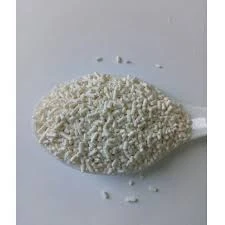
Exploring the Role of Potassium Sorbate in Food Preservation and Safety
The Role of Potassium Sorbate in Food Preservation
In the realm of food preservation, potassium sorbate has established itself as a crucial ingredient in extending the shelf life of various products. As a potassium salt of sorbic acid, it possesses potent antimicrobial properties that inhibit the growth of molds, yeasts, and some bacteria, making it a preferred choice in the food industry.
What is Potassium Sorbate?
Potassium sorbate (C6H7KO2) is a white crystalline powder that is highly soluble in water. It is a widely used food additive, classified as a preservative under the E number E202. Its effectiveness stems from its ability to prevent spoilage and maintain the quality of food products, thus ensuring consumer safety and satisfaction.
Applications in the Food Industry
Potassium sorbate is commonly found in a variety of food items, including baked goods, dairy products, beverages, and salad dressings. Its efficacy as a preservative has made it particularly popular in products that contain high moisture levels, which are more prone to microbial growth. For instance, in cheese production, potassium sorbate can prevent the growth of unwanted molds, allowing cheese to maintain its texture and flavor over time.
In the realm of beverages, especially in wines and carbonated drinks, potassium sorbate serves an essential function by inhibiting spoilage organisms that could otherwise lead to fermentation and undesirable flavors. Many manufacturers also use it in dried fruits and jams, which helps preserve their freshness while preventing unwanted microbial activity.
Safety and Regulatory Status
potassium sorbate use in food

The use of potassium sorbate in food products is regulated by various health organizations worldwide. In the United States, the Food and Drug Administration (FDA) recognizes potassium sorbate as safe for consumption within specified limits. Similarly, the European Food Safety Authority (EFSA) has assessed its safety, concluding that it does not pose any significant health risks when used appropriately.
Research into the effects of potassium sorbate has generally shown it to be low in toxicity, making it suitable for a wide array of food applications. However, some individuals may be sensitive to preservatives and could experience mild allergic reactions. Thus, labeling requirements are vital for consumer awareness and protection.
Benefits of Using Potassium Sorbate
The incorporation of potassium sorbate in food products offers numerous benefits. By controlling microbial growth, it not only extends the shelf life of products but also reduces food waste, which is a growing concern in today's society. This preservation capability allows food manufacturers to distribute products over longer distances without the immediate need for refrigeration, making it a valuable tool in food logistics.
Furthermore, potassium sorbate is tasteless and odorless, which means it does not alter the sensory characteristics of food. This neutrality makes it an attractive option for food manufacturers who wish to maintain the original flavor profile of their products while ensuring safety and longevity.
Conclusion
In conclusion, potassium sorbate plays a significant role in food preservation by preventing spoilage and extending shelf life. Its widespread use across various food products reflects its effectiveness and safety as a preservative. As the demand for convenient, long-lasting food products continues to rise, potassium sorbate's importance in food manufacturing will likely remain strong. However, it is essential for consumers to remain informed about food additives and make choices that align with their dietary preferences. The continued examination and understanding of additives like potassium sorbate will help balance food safety with consumer demands for quality and taste.
-
Pure Sodium Dichloroisocyanurate Dihydrate | Powerful DisinfectantNewsAug.29,2025
-
Industrial Chemicals: Quality & Purity for Every IndustryNewsAug.28,2025
-
Nitrile Rubber Honoring Strict Production StandardsNewsAug.22,2025
-
Aspartame Ingredients Honoring Food Safety ValuesNewsAug.22,2025
-
Fertilizer for Balanced Plant NutritionNewsAug.22,2025
-
Cyanide Gold Processing with High Purity AdditivesNewsAug.22,2025
-
Formic Acid in Textile Dyeing ApplicationsNewsAug.22,2025
Hebei Tenger Chemical Technology Co., Ltd. focuses on the chemical industry and is committed to the export service of chemical raw materials.
-

view more DiethanolisopropanolamineIn the ever-growing field of chemical solutions, diethanolisopropanolamine (DEIPA) stands out as a versatile and important compound. Due to its unique chemical structure and properties, DEIPA is of interest to various industries including construction, personal care, and agriculture. -

view more TriisopropanolamineTriisopropanolamine (TIPA) alkanol amine substance, is a kind of alcohol amine compound with amino and alcohol hydroxyl, and because of its molecules contains both amino and hydroxyl. -

view more Tetramethyl Thiuram DisulfideTetramethyl thiuram disulfide, also known as TMTD, is a white to light-yellow powder with a distinct sulfur-like odor. It is soluble in organic solvents such as benzene, acetone, and ethyl acetate, making it highly versatile for use in different formulations. TMTD is known for its excellent vulcanization acceleration properties, which makes it a key ingredient in the production of rubber products. Additionally, it acts as an effective fungicide and bactericide, making it valuable in agricultural applications. Its high purity and stability ensure consistent performance, making it a preferred choice for manufacturers across various industries.





